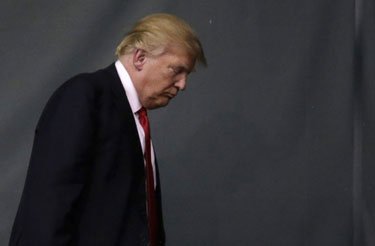LawNewz provides answers to the question a lot of people are asking right now.
So, with exactly a month to go until Election Day, what happens if Trump is forced to drop out of the Presidential race? Or if the GOP forces him out? It’s a bit complicated, so let’s explain what we know about the process.
Republican National Committee Rule # 9 outlines what happens when there is a Republican nomination vacancy due to “death, declination or otherwise.â€
It basically says that there are two ways for the Republicans to re-nominate a candidate if Trump drops out. 1) They could reconvene at another convention and have all of the 2,472 delegates vote, or 2) the 168-member committee could decide with each member getting a portion of votes based on the population of the state they represent. Number 2 seems like a more likely scenario.
Seems simple? Not so fast. Since we are exactly a month away from the election, there is one major problem: The ballot deadlines have passed in nearly every state. For example, in West Virginia, the law says a candidate must withdraw “no later than eighty-four days before the general election.†With thirty days to go, we are obviously too late. Each state has different rules about what happens if there is a vacancy. So, even if the Republicans pick a new nominee, it is likely Trump’s name will appear on the ballot in most states. …
Professor Edward Foley, who is the director of election law at Moritz School of Law at Ohio State, talked to LawNewz.com about what could happen if the GOP decided to go with another Presidential candidate (for example, Mike Pence):
If Trump publicly withdraws, it makes it easier for GOP leadership to orchestrate a public plan in which to explain to the electorate that by voting for “Trump/Pence†on the ballot they are actually voting for Pence/Kasich (or Pence/_______, whoever they pick for the new V-P slot). It would be legally equivalent to the circumstance in which Trump had died, and the GOP needed to announce a replacement even though it was too late to reprint the ballots.
But Trump doesn’t need to withdraw for the GOP leadership to pursue a comparable public plan whereby they repudiate him. The RNC could attempt to invoke its own rules to declare that, over Trump’s objections, he’s no longer the party’s nominee. If the RNC were to take that route, it might put the GOP on stronger legal footing under various state laws concerning the party’s slate of presidential electors.
But from the perspective of the U.S. Constitution, and the Electoral Count Act of 1877, which are the two key pieces of federal law, it is not essential that the RNC take that kind of formal step under its own party rules. If there is a well-publicized plan in which McConnell, Ryan, and other party leaders all announce that they want the GOP presidential electors to vote for Pence for president, not Trump, and that’s what the GOP presidential electors do on December 19—in those states in which the GOP presidential electors received more popular votes that Clinton electors—then Pence (or whoever the GOP picks) is the choice that gets sent by those electors from those states to Congress for opening and counting on January 6.
It obviously matters whether or not the GOP can reach 270 Electoral College votes for Pence (or whomever they pick) under this strategy. If not—in other words, if Clinton wins enough states so that her electors have 270 or more—what the GOP electors do is irrelevant. Clinton is declared presidential-elect, assuming Congress confirms so on January 6.






Seattle Sam
I’m hardly a Trump supporter, but I practically puke every time I hear Democrats call for Trump to withdraw. These are the same people who told us to “move on” after Bill Clinton’s behavior was widely publicized. Is locker room talk really more reprehensible than rape?
morontamer
hahaha how’d it work out LOLOLOL
Please Leave a Comment!